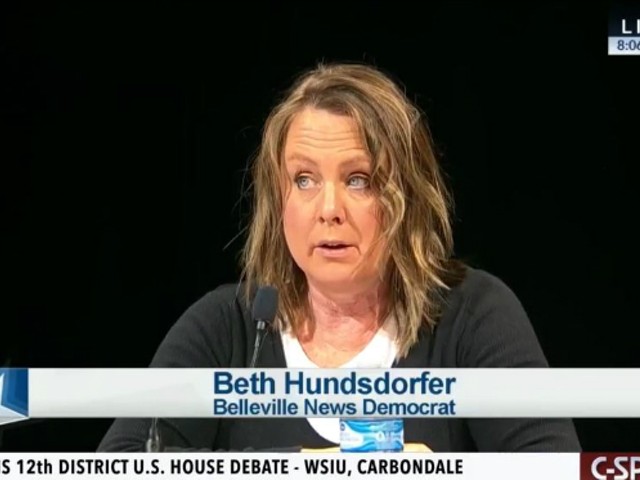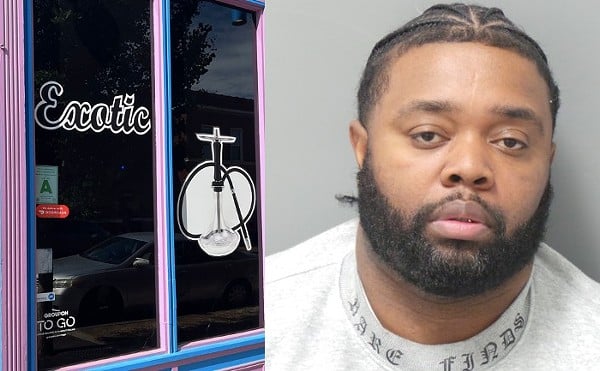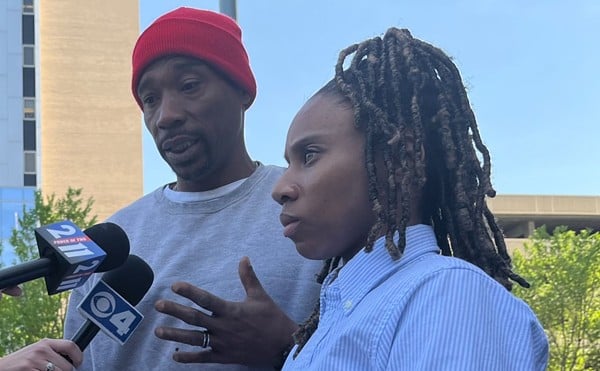When Syrhea Conaway first joined KDHX's programming committee, she just wanted to help.
A local musician, teaching artist, youth mentor and adjunct faculty member at COCA, she'd been approached by the station's executive director, Kelly Wells, she says, and asked to help with the organization's goals of increasing diversity and inclusion in its programming, which had for years been accused of leaning too heavily on folk music and similar genres with largely white fan bases. Conaway, like many in the St. Louis area, regarded the independent radio station highly, and as a black woman she supported those stated goals. She was appointed to the volunteer position by the board of directors in March 2018.
"I take pride in the work that I do, and I don't just join things just to be like, 'Oh, I'm on this and I do this,'" she explains. "It's not about me. I believe in this stuff."
Conaway wasn't the only local black luminary brought on to KDHX (88.1 FM) under Wells. Darian Wigfall, a former scientist at Washington University as well as an author, youth mentor and current director of operations for the artist collective FarFetched, was hired on as event coordinator in June 2017. Vice Chairman of the St. Louis Blues Society Alonzo Townsend, the son of Grammy-winning blues legend Henry Townsend and a former entertainment director at the National Blues Museum, as well as co-head of local label Knox Entertainment, was hired as community engagement coordinator in July 2018.
Larry Morris, coordinator for the Multicultural Center and International Student Affairs at Webster University and frontman for the local hip-hop collective Illphonics, was brought on to the programming committee in April 2018. Local musician Tonina Saputo, whose accolades include being named one of the best new artists of 2018 by both NPR and former President Barack Obama, was brought on as music coordinator in August 2018.
If the goal was to promote diversity and inclusion, as Wells told Conaway, KDHX had hired itself a veritable dream team.
But today, only Conaway and Saputo remain — and the latter was furloughed indefinitely on July 23. Wigfall was "quit-fired," as he terms it, in September 2018. Townsend was let go in April 2019. Morris stepped down from the programming committee in June. And each of the five had negative experiences at the station that became Exhibit A in a detailed, seven-page letter written by an anonymous group of former staffers and volunteers and released to media in May.
Wells and the board have pushed back on the letter's claims, saying many of its most incendiary allegations are simply not true. But what is irrefutable is that the station is facing the awkward prospect of the majority of its former dream team turning on it – and that many of those recruited by Wells to increase diversity have become her harshest critics.
Conaway freely admits she has one foot out the door.
"My heart feels bad being here. I don't want to be here," she says she told leadership earlier this year. "I want to do this work, but it seems like you guys don't want to do the work. I feel like I'm being used. And I have no problem just packing up my stuff and saying, 'Thank you for the opportunity, but no thanks.'"
In early January, KDHX's Facebook account shared a meme. Playing off the "distracted boyfriend" memes then filling social media, it depicted two people: one a man of unclear ethnicity strumming on an acoustic guitar, the other a smiling white woman with her head turned away bashfully. Text on the man identified him as "KDHX," while the woman was marked as "St. Louis."
Accompanying the image was a question. "At KDHX, our new year's resolution is to serve the community in more mindful, more engaging and more inclusive ways. What do you want to see and hear from the station in 2019?"
Some commenters responded in earnest. "Ease up on the banjos," one wrote. "More metal and punk. Keep the reggae and throwback hip-hop though," said another.
But some found the choice of imagery a bit ... odd.
"I didn't realize KDHX was trying to get in St. Louis' pants," wrote one commenter. "This gal looks sooooo uncomfortable and wishes this dude would just stop," opined another. "Would love to know the gender of the individual who thought that a stock photo of a woman being low-key sexually harassed was an ideal choice," added a third.
Eric Hall, a well-known local musician, combined those approaches.
"I think the image you shared might help explain how off-target your impression of what the St. Louis community both is and wants if you're supposing St. Louis is a giggly white woman and KDHX is a dude playing acoustic guitar at her in a cut-off flannel," he wrote.
In some ways, the discussion seems trivial – the image, after all, was a meme. But it came during a time that KDHX was actively trying to be more inclusive in its programming – something even the post itself referenced.
And rather than take Hall's criticism as constructive, whoever was manning KDHX's Facebook account fired back in the comments, accusing him of "trolling" and "complaining."
Hall, seldom one to back down from an online scrap, responded, "When directly asked how you could better serve the community, my expressing that KDHX seems to be largely old white people music and not actually aware of the broader community is considered trolling?"
The sniping continued for several days. Finally, a week later, the station apologized, stating simply in the comments, "We are sorry for the tenor of this post. We are listening."
Behind the scenes, Conaway was baffled by the station's approach. She and Morris addressed the matter at the next meeting of the programming committee, telling the station's leadership that depicting St. Louis as a blushing white woman was problematic.
"OK, maybe y'all didn't think about that image. And it's OK, mistakes happen, that's how you learn," Conaway says of the incident. "But to be very defensive and argumentative as the official KDHX page? This is not rocket science. You guys need to own your mistakes. You messed up, come out and say, 'You know what, this image we posted was problematic and we're gonna do better.' You know, just own it!"
KDHX leadership says a management meeting was subsequently held to implement better practices around content creation and publication.
Taken alone, the ill-chosen meme may not seem like much. But for some staffers and volunteers, it was just the latest tone-deaf action in a long roster, many of them with unpleasant racial overtones. In anonymous letters sent to the board and then later the media, they accuse station brass of tokenism, saying black staffers were made to pose for social media posts meant to highlight the station's diversity; discrepancies between the treatment of white staffers and those of color; bait-and-switch tactics with job titles and responsibilities, wherein black staffers are hired on to one job only to see their responsibilities and titles immediately reduced; and awkward instances of racial insensitivity.
The RFT spoke with more than a dozen current and former KDHX staffers, programmers and volunteers, including those who were responsible for the anonymous letters. Most asked to remain anonymous. They describe a culture of dysfunction, saying that employees who question leadership are often terminated or otherwise face retaliation. They also claim there's been a staggering rate of turnover at the station in the past year – at least eight employees have quit or been let go at an organization that currently lists only ten staff positions on its website.

According to KDHX's leadership, five full-time employees were fired between January 2018 and June 2019, all KDHX staffers. They say three part-time employees of its first-floor cafe and bar were let go in that time period as well, but the station does not list those positions on its website.
Three out of those eight who were fired were people of color, KDHX's leadership acknowledges. Townsend and Wigfall were two of the station's black staffers that were fired, along with a part-time bar employee. Then, on July 23, four KDHX staffers were furlouged indefinitely without pay for financial reasons. Digital Media Cordinator KE Luther, Production Coordinator Jon Valley, Officer Manager Kati Giblin and Saputo, the station's music department coordinator and sole remaining black staffer, were all told not to report to work for the foreseeable future. KDHX denies that any racial bias was behind the firings. "KDHX treats people fairly and has only dismissed people for cause, and by the book," Board President Paul Dever says. Still, for an organization that has touted efforts to increase its diversity, it's clearly a step back. And now, the station's website lists just five non-furloughed employees — all of them white.
The allegations against KDHX probably would not get much traction at another station. Few of the complaints about KDHX's leadership rise to a level that would worry an HR department in corporate radio. For example, some critics don't like the fact that Wells, who is white, wears her hair in dreadlocks. While that's a common cause of consternation in progressive circles, it likely wouldn't register as a blip on the radar in a different environment.
But KDHX doesn't have advertisers; it has donors, who were responsible for nearly half of its $1.38 million in revenue in 2017, according to its annual report. Proudly independent and non-corporate, its progressive values are a big part of its calling card. It doesn't broadcast to make money; its 81 independently produced shows and seven podcasts "proudly present independent voices and opportunities for all" and "strive to reflect the diversity of our community as we fulfill our mission to build community through media."
From Conaway's perch as a volunteer, her assessment is that KDHX is good at lofty platitudes but not serious about actually doing the necessary work to truly make the station a diverse and inclusive environment.
"Kelly is a very talented writer and speaker," she says of the station's executive director, Wells. "She's a very talented orator. She will say things that are very inspiring, but then you watch her and she will not do those things."
Conaway adds, "There's a misalignment between actions and words. But for people who don't actually see what's going on behind the curtain, they rally behind what she says, because what she says are things that people can definitely believe in. But it's the doing that I'm more concerned about. I don't care what you say. You shouldn't have to say anything to me; I should see it by what you do. And I'm not seeing it."
The people behind the letter say they never wanted it to get to this point. But KDHX has no human resources director, so staffers with grievances are told to follow a chain of command: Bring any complaints to an immediate supervisor first, then to Wells, then, finally, come to the board.
Interestingly enough, that's how Wells herself ended up as executive director. In 2015, as KDHX fell behind on its payroll taxes and employees began receiving their paychecks late, Wells, then KDHX's chief engagement officer and director of the station-affiliated Folk School, which hosts classes and workshops dedicated to the genre, led a group of staffers to approach the board with their concerns. The station's longtime executive director was subsequently terminated by Dever, and Wells was named interim executive director. A few months later, the "interim" was dropped.
Now she's the one at the center of many of the letters' complaints.
In the first letter, hand-delivered to each board member in March and later obtained by the RFT, the anonymous writers alleged mismanagement of funds, retaliatory treatment of employees and poor leadership, and they asked the board to investigate.
In response, Dever called the allegations "vague and ambiguous" in an email obtained by the RFT. "Without more specificity about your concerns, it is simply impossible for KDHX to investigate or to respond," he wrote.
That's when the group, which identifies itself only as "Concerned Parties," reached out to local media.
"Anonymous claims are necessary in an organization that has been strategically structured, by the Executive Director, to have totalitarian control over the institution," that letter alleged. "These claims are necessary when employees who question strategies, finances, and benefits are terminated without just cause or documentation. They are necessary when the ED has the board wrapped around their finger and publicly slanders anyone who expresses concern."
The letter wraps up with a clear statement of the group's goals.
"The music community, the arts community, the regional community deserve better," it concludes. "Remove the Executive Director and Engagement Officer who violate ethical and legal standards. If the board refuses to do their duties in oversight, remove them too. This is overdue."







